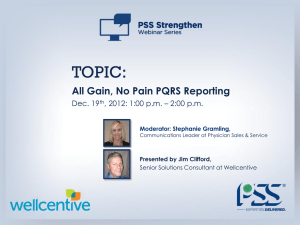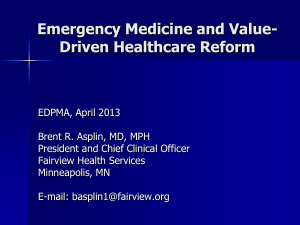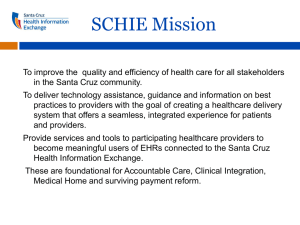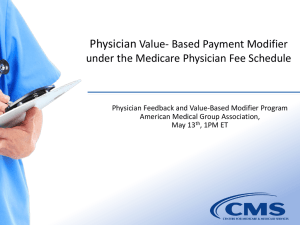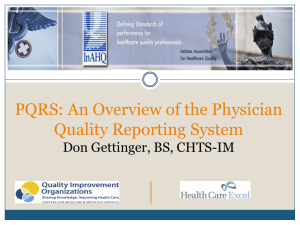Sustaining Quality Improvement in Resident Care
advertisement
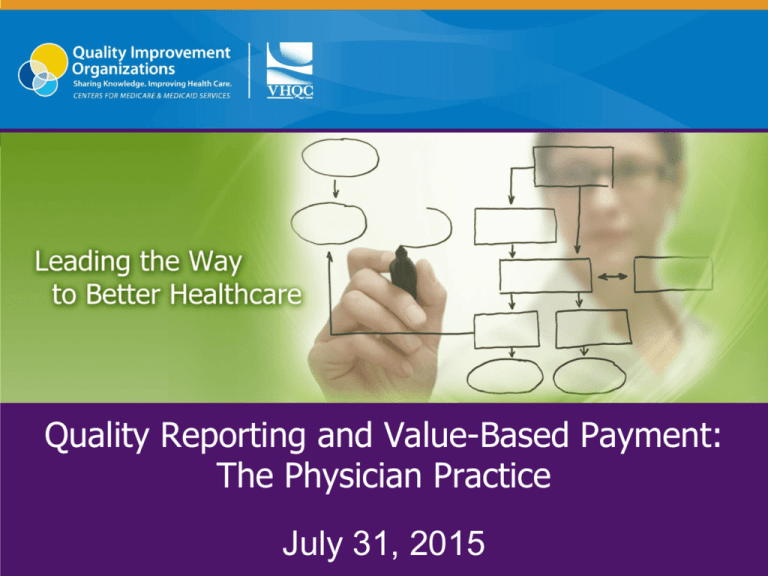
Quality Reporting and Value-Based Payment: The Physician Practice July 31, 2015 VHQC Non-profit health quality consulting company since 1984 Virginia and Maryland’s Quality Innovation Network Quality Improvement Organization for CMS Virginia’s Regional Extension Center as designated by ONC Provides outreach, education, and comprehensive EHR services to providers and healthcare organizations Agenda 1) VHQC Introduction 2) Meaningful Use (MU) a. Timeline Highlights b. Payment Adjustments & Hardship Exception 3) Physician Quality Reporting System (PQRS) a. Incentive & Adjustments b. Reporting Methods c. PQRS Measure Information d. Measures Applicability Validation e. Quality and Resource Use Report (QRUR) 4) Value-Based Payment Modifier 5) Resources EHR Incentive Program: Meaningful Use Improved Quality and Outcomes Stage 2 Advanced clinical processes Stage 3 Improved outcomes Stage 1 Data capture and sharing Better clinical outcomes Improved population health outcomes Increased transparency and efficiency Empowered individuals More robust research data on health system Notice of Proposed Rulemaking to Meaningful Use in 2015-2017 Stay Tuned for Changes! To better align Stages 1 & 2 with Stage 3, CMS proposes: 1. Reducing the overall number of objectives to focus on advanced use of electronic health records (EHRs); 2. Removing measures that have become redundant, duplicative or have reached wide-spread adoption; 3. Realigning the reporting period beginning in 2015, so hospitals would participate on the calendar year instead of the fiscal year; and 4. Allowing a 90 day reporting period in 2015 to accommodate the implementation of these proposed changes in 2015. MU Timeline Highlights 2015 Reporting Periods Stay Tuned for Changes! 1) First time attesters only: 90-day reporting period 2) Providers beyond their first year of Meaningful Use: FULL CALENDAR YEAR – follow CMS closely for changes MU Timeline Highlights 2015 Reporting Periods 1) Anticipated to be February 28, 2016 for the 2015 reporting period 2) 2014 was the last year to start Medicare Electronic Health Record (EHR) Incentive Program and receive incentives. First time attesters in 2015 will not receive an incentive, but will avoid the 2017 payment adjustment. How do meaningful use payment adjustments work? Stay Tuned for Changes! -1% 2015 Payment Adjustment Avoided If -2% 2016 Payment Adjustment Avoided If -3% 2017 Payment Adjustment Avoided If Attested to MU for the Attested to MU for the 2013 reporting period OR 2014 reporting period OR Attested to MU for the 2015 reporting period OR Attested to MU for the first time by October 1, 2015 OR Attested to MU for the first time by October 1, 2016 OR CMS approves a hardship exception application specific to 2016 payment adjustment CMS approves a hardship exception application (form not yet released) specific to 2017 payment adjustment Attested to MU for the first time by October 1, 2014 OR CMS approved a hardship exception application specific to 2015 payment adjustment Payment Adjustments 1) Affect Medicare Part B payments 2) Follow the individual provider 3) CMS Payment Adjustment Tip sheet https://www.cms.gov/Regulations-andGuidance/Legislation/EHRIncentivePrograms/Downloads/Pay mentAdj_HardshipExcepTipSheetforEP.pdf Hardship Applications 1) Hardship exception applications are developed for each payment adjustment year 2) Hardship exception application for 2015 reporting period (to avoid 2017 payment adjustments) not yet released 3) Cannot use old hardship applications from previous years EHR Participation Timeline Online tool to help determine a provider’s year and stage of Meaningful Use http://cms.gov/Regulation s-andGuidance/Legislation/EHRI ncentivePrograms/Particip ation-Timeline.html Medicare What stage am I in? Stay Tuned for Changes! Started 2011 2015 MU Attestation • • • • Stage 2 Full calendar year $1,960 incentive Avoids 2017 payment adjustment Started 2012 2015 MU Attestation • • • • Stage 2 Full calendar year $3,920 incentive Avoids 2017 payment adjustment Started 2013 In 2015 MU Attestation Started 2014 • • • • 2015 MU Attestation Stage 2 Full calendar year $7,840 incentive Avoids 2017 payment adjustment *Stages shown are not reflective of providers who have skipped program years. • • • • Stage 1 Full calendar year $7,840 incentive Avoids 2017 payment adjustment Medicaid What stage am I in? Stay Tuned for Changes! AIU 2012 AIU 2013 2015 MU Attestation • Stage 2 • Full calendar year • $8,500 incentive • Avoids 2017 payment adjustment for Medicare Part B claims 2015 MU Attestation • Stage 1 • Full calendar year • $8,500 incentive • Avoids 2017 payment adjustment for Medicare Part B claims *Stages shown are not reflective of providers who have skipped program years. AIU 2014 2015 MU Attestation • Stage 1 • Any 90 days • $8,500 incentive • Avoids 2017 payment adjustment for Medicare Part B claims Questions to ask now! 1) Are provider claims already subject to payment adjustment in 2015? 2) What stage should I be working on in 2015? 3) Does staff know if your reporting period has already started? 4) Does staff know how to utilize technology (EHR and patient portal) in a way that counts for meaningful use reports? Physician Quality Reporting System Program Payment Adjustments 1) Individual Eligible Professionals (EPs) and group practices that do not satisfactorily participate and report in the 2015 PQRS program year will be subject to a 2% penalty downward payment adjustment in 2017 PQRS Performance Year PQRS Payment Year Negative Adjustment Rate 2013 2015 -1.5% 2014 2016 -2.0% 2015 2017 -2.0% 1) Penalty applied to all of the EP’s Part B covered professional services under Medicare Physician Fee Schedule (MPFS) during the payment adjustment year 2) EPs are identified by their individual national provider identifier (NPI) and tax identification number (TIN) Reporting Methods Claims • Select measures and begin reporting by submitting Quality Data Codes on claims Qualified Registry • Entity that collects clinical data from an EP or Group and submits to CMS on behalf of the EP/Group. Refer to the 2015 Participating Registry Vendors EHR-Direct • EP generates files from their EHR – EP uploads to CMS at year end EHR-Data Submission Vendor • Data electronically shared with DSV – DSV uploads to CMS at year end Qualified Clinical Data Registry (QCDR) • CMS approved entity that collects & submits data on behalf of EPrefer to 2015 Participating Qualified Clinical Data Registry GPRO Web Interface • Secured internet-based application available in the PQRS portal to pre-registered users CAHPS – Certified Survey Vendor • Supplemental to other reporting mechanisms Individual or Group Reporting Individual Reporting • EHR Direct Product that is Certified Electronic Health Record Technology (CEHRT) • EHR Data Submission Vendor that is CEHRT • Qualified PQRS registry • Qualified Clinical Data Registry (QCDR) • Medicare Part B Claims Group Reporting • EHR Direct Product that is CEHRT • EHR Data Submission Vendor that is CEHRT • Qualified PQRS registry • GPRO Web Interface (25+ providers) • Consumer Assessment of Healthcare Providers and Systems (CAHPS) survey for PQRSsupplemental to other reporting mechanisms Group Practice Reporting GPRO Registration 1) Three GPRO group sizes: a. 100 + EPs b. 25 – 99 EPs c. 2 – 24 EPs 2) Reporting mechanisms & requirements vary depending on the group size at time of registration 3) The reporting mechanism selected during registration will be the only PQRS submission method available to the group and all individual NPIs that bill Medicare under the group’s TIN for PQRS during the reporting year Measure Selection Consider important factors when selecting 2015 PQRS measures for reporting: 1. Clinical conditions usually treated 2. Types of care typically provided, e.g. preventive, chronic, acute 3. Settings where care is usually delivered, e.g. office, ED, surgical suite 4. Quality Improvement goals for 2015 5. Other quality reporting programs in use or being considered 6. Review specifications for the selected reporting option for each measure under consideration Measure Selection Review the 2015 PQRS Measures List available in the Measure Codes section of the CMS-PQRS website 1. http://www.cms.gov/Medicare/Quality-Initiatives-PatientAssessment-Instruments/PQRS/MeasuresCodes.html 2. Not all measures are available under each PQRS reporting option 3. The GPRO Web interface reporting option has set measures, all of which must be reported 4. Avoid individual measures that do not or may infrequently apply to the services provided 5. PQRS measure set and resulting measure specifications change from year to year Measure Selection 1) New - 2015 Cross-Cutting Measures Requirement: a. Applies to PQRS claims and registry reporting options b. EPs and groups are required to report one cross-cutting measure if they have at least one Medicare patient face-to-face encounter PQRS Cross-Cutting Measure Title Measure # CAHPS for PQRS Clinician/Group Survey 321 047 046 131 Care Plan Childhood Immunization Status Closing the Referral Loop Receipt of Specialist Report Controlling High Blood Pressure Diabetes: Hemoglobin A1c Poor Control Documentation of Current Medications in the Medical Record Falls: Screening for Fall Risk Functional Outcome Assessment Hepatitis C: One-Time Screening for Hepatitis C Virus (HCV) for Patients at Risk Medication Reconciliation Pain Assessment & Follow-Up 111 Pneumonia Vaccination Status for Older Adults 240 374 236 001 130 318 182 400 110 128 134 317 226 402 Preventative Care & Screening: Influenza Immunization Preventive Care & Screening: BMI Screening and Follow-Up Plan Preventive Care & Screening: Screening for Clinical Depression & Follow-Up Plan Preventive Care & Screening: Screening for High Blood Pressure & Follow-Up Documented Preventive Care & Screening: Tobacco Use: Screening & Cessation Intervention Tobacco Use and Help with Quitting Among Adolescents Measures & Reporting Resources 1) 2015 PQRS Implementation Guide a. Provides guidance about how to select measures for reporting, how to read and understand a measure specification, and outlines the various reporting methods available for 2015 PQRS b. Details how to implement claims-based reporting of measures to facilitate satisfactory reporting of Quality-Data Codes (QDCs) by EPs c. Provides decision trees to assist EPs with selecting reporting method 2) 2015 PQRS Measures List a. Identifies & describes the measures used in PQRS, including all available reporting methods, PQRS & National Quality Forum (NQF) numbers, National Quality Strategy (NQS) domains, & measure developers Both resources are available at: http://www.cms.gov/Medicare/QualityInitiatives-Patient-Assessment-Instruments/PQRS/MeasuresCodes.html Measure Applicability Validation 1) Satisfactory Claim and Registry-Based Reporting a. Report each measure for at least 50% of the Medicare Part B FFS patients seen during the reporting period to which the measure applies b. Report at least 9 measures covering 3 NQS domains c. Measures with a 0% performance rate would not be counted 2) Measure Applicability Validation (MAV) Process a. Claims-based MAV: applies to EPs reporting less than 9 measures OR 9 or more measures with less than 3 domains b. Registry-based MAV: applies to EPs and group practices reporting less than 9 measures OR 9 or more measures with less than 3 domains Value-Based Payment Modifier Value-Based Payment Modifier 1) 2) 3) 4) 5) Aligned with and is based on participation in PQRS Assesses both quality of care furnished and the cost of that care under the Medicare Physician Fee Schedule (PFS) Payment adjustment made on a per claim basis to Medicare payments for items & services furnished Applied at TIN level & applies to all physicians billing under that TIN Phased in: Performance Year VM Payment Adjustment Year Group Size Affected EPs affected by penalty CY 2013 CY 2015 Physician Groups ~ 100+ EPs Physician EPs CY 2014 CY 2016 Physician Groups ~ 10+ EPs Physician EPs CY 2015 CY 2017 Physician Groups & Solo Practices ~ 2+ EPs Physician EPs CY 2016 CY 2018 Physician Groups & Solo Practices ~ 2+ EPs Physician and NonPhysician EPs Value Modifier Outcome Measures The quality measurement component of the Value Modifier includes three outcome measures that CMS calculates from FFS Medicare claims: 1) two composite measures of hospital admissions for ambulatory care-sensitive conditions a. acute conditions (bacterial pneumonia, urinary tract infection, dehydration) b. chronic conditions (chronic obstructive pulmonary disease, heart failure, diabetes) 2) one measure of 30-day all-cause hospital readmissions. 3) CAHPS surveys required in some cases Value Modifier Cost Measures The cost measures include: 1) Total per capita costs measure (annual payment standardized and risk-adjusted Part A and Part B costs) 2) Total per capita costs for beneficiaries with four chronic conditions (chronic obstructive pulmonary disease, heart failure, coronary artery disease, diabetes) 3) Medicare spending per beneficiary for all A and B costs during the 3 days before and 30 days after a Medicare inpatient hospital stay Incentives and Payment Adjustments: VM 2017 Calculation Groups of 2-9 Eligible Professionals and Solo Practitioners Cost/Quality Low Quality Average Quality High Quality Low Cost +0.0% +1.0x +2.0x Average Cost +0.0% +0.0% +1.0x High Cost +0.0% +0.0% +.0.0% PQRS/Value-Based Payment Modifier: What Medicare Professionals Need to Know in 2015 5/18/2015 https://www.youtube.com/watch?v=Ww0oH-FhaYM 30 Incentives and Payment Adjustments: VM 2017 Calculation Groups of 10 or More Eligible Professionals Cost/Quality Low Quality Average Quality High Quality Low Cost +0.0% +2.0x +4.0x Average Cost -2.0% +0.0% +2.0x High Cost -4.0% -2.0% +0.0% PQRS/Value-Based Payment Modifier: What Medicare Professionals Need to Know in 2015 5/18/2015 https://www.youtube.com/watch?v=Ww0oH-FhaYM 31 Quality & Resource Use Report 1) QRUR - annual reports that provide physicians and physician groups with: a. Comparative information about the quality of care furnished and the cost of that care to the practice’s Medicare FFS patients – based on PQRS and claims data b. Beneficiary-specific information to help coordinate and improve the quality and efficiency of care furnished c. Displays your performance related to the CMS Value-Based Payment Modifier - Value Modifier (VM) program 2) Access report via CMS secure portal - must first sign up for IACS account. Instructions at: http://www.cms.gov/Medicare/Medicare- Fee-for-Service-Payment/PhysicianFeedbackProgram/Obtain-2013QRUR.html Summary Incentives and Payment Adjustments Eligibility for All Programs PQRS Medicare Physicians Doctor of Medicine Doctor of Osteopathy Doctor of Podiatric Medicine Doctor of Optometry Doctor of Oral Surgery Doctor of Dental Medicine Doctor of Chiropractic Practitioners Physician Assistant Nurse Practitioner Clinical Nurse Specialist Certified RN Anesthestist Certified Nurse Midwife Clinical Social Worker Clinical Psychologist Registered Dietician Nutrition Professional Audiologists Therapists Physical Occupational Qualified Speech-Language Value Modifier Eligible for Incentive Subject to Payment Adjustment Included in Definition of "Group" X X X X X X X X X X X X X X X X X X X X X X X X X X X X X X X X X X X X X X X X X X X X X X X X X X X X X X X X X X X X EHR Incentive Program Subject to VM Eligible for Medicare Incentives Eligible for Medicaid Incentive X X X X X X X X X X X X X X X X X X X X X Subject to Medicare Payment Adjustment X X X X X X X Incentives and Payment Adjustments: MU 1) Incentives for Meaningful Use end in 2015 2) Medicare eligible professionals who do not meet the requirements for meaningful use by 2015 and in each subsequent year are subject to payment adjustments to their Medicare reimbursements that start at 1% per year, up to a maximum 5% annual adjustment. 35 Incentives and Payment Adjustments: PQRS 1) Phased-in approach 2) Two year look back period 3) By 2017, all solo practitioners and eligible professionals in groups of any size will be subject to a 2% downward adjustment if they do not report PQRS data for 2015 4) Failure to report PQRS data automatically results in a downward adjustment in the value modifier for physicians for 2017 in groups with 10 or more eligible professionals 5) Solo practitioners and groups of 2-9 eligible professionals who report PQRS data in 2015 will only receive a neutral or upward adjustment in the value modifier in 2017, since 2015 is their first performance year Incentives and Payment Adjustments: VM 1) 2) 3) 4) 5) 37 Phased-in approach Groups of 100 or more eligible professionals are subject to an upward, neutral or downward adjustment in 2015 based upon performance year 2013 Groups of 10 or more eligible professionals are subject to an upward, neutral or downward adjustment in 2016 based upon performance year 2014 Solo practitioners and groups of 2-9 are only subject to a neutral or upward adjustment in 2017, since 2015 is their first performance year In any size group, failure to report PQRS will result in an automatic downward adjustment in PQRS and the Value Modifier in 2017 based upon performance year 2015 Payment Adjustment Example Performance Year 2015, Payment Adjustment Year 2017 Meaningful Use -3% PQRS -2% Value Modifier -4% -9% Payment Adjustment Based on this example: For every $100,000 in Medicare funds, your practice risks losing up to $9,000 in payment adjustments.** **Calculation is based on estimate for the 2017 payment year. The Value Modifier adjustment is dependent upon group size 38 Help Desk Resources 1) QualityNet Help Desk: a. b. c. d. e. f. 866-288-8912 or qnetsupport@hcqis.org 8:00 am – 8:00 pm EST M-F IACS registration questions IACS login issues PQRS portal password issues PQRS feedback report availability and access PQRS Program questions 2) VM Help Desk: a. b. 888-734-6433 ~ option 3 or pvhelpdesk@cms.hhs.gov Value-Based Payment Modifier Program questions 3) EHR Incentive Program Information Center: a. b. 888-734-6433 or pvhelpdesk@cms.hhs.gov EHR Incentive Program (Meaningful Use) Stay Connected Connect with us for the latest, up-to-date information. @MD_VAQIN www.qin.vhqc.org Questions Contact VHQC Jennifer Chenault-Walker Manager, Program Operations Jchenault-walker@vhqc.org 804.289.5334 Sandra Gaskins Improvement Consultant QIN QIO sgaskins@vhqc.org 804.289.5346 This material was prepared by VHQC, the Medicare Quality Innovation Network Quality Improvement Organization for Maryland and Virginia, under contract with the Centers for Medicare & Medicaid Services (CMS), an agency of the U.S. Department of Health and Human Services. The contents presented do not necessarily reflect CMS policy. VHQC/11SOW/6/17/2015/2177
